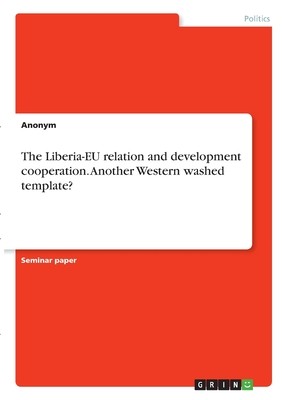
- We will send in 10–14 business days.
- Author: Anonym
- Publisher: GRIN Verlag
- Year: 2020
- Pages: 34
- ISBN-10: 3346280276
- ISBN-13: 9783346280275
- Format: 14.8 x 21 x 0.2 cm, minkšti viršeliai
- Language: English
- SAVE -10% with code: EXTRA
The Liberia-EU relation and development cooperation. Another Western washed template? (e-book) (used book) | bookbook.eu
Reviews
Description
Seminar paper from the year 2020 in the subject Politics - International Politics - Topic: European Union, grade: 2,3, language: English, abstract: The aim of this paper is to analyze DevCo(Development cooperation) agreements between Liberia and the EU to examine the extent to which the EU development 'aid' policy maintains global power imbalances in Liberia. Therefore, this paper presents an advisory report by Human Rights Watch (HRW) for the European Commission to persuade the Commission to question its approaches in DevCo. As a first step, the theoretical framework including the legal aspects on which the EU's development cooperation is based and the concepts of postcolonialism and resilience will be presented. On the basis of this conceptual structure the Liberia-EU relation will be investigated through focusing on the Cotonou agreement and the National Indicative Programme (NIP) between Liberia and the EU to analyze power imbalances. Since the EU has an expressed competence to conclude bilateral or multilateral agreements with Third Countries (TC), the EU developed a strong legal position and assigned responsibility for development cooperation (DevCo) and humanitarian aid. Hence, the EU concludes DevCo agreements with countries of the Global South like Liberia to promote sustainable development and eradicate hunger and poverty following the UN's Sustainable Development Goals. However, the EU's DevCo is called into question because frequently the EU sacrifices important principles such as partnership or human rights to the domestic policy-driven goal of preventing migration movements towards Europe. Thus, the practices of development aid reproducing power imbalances like the loss of cultural identity and social capital are maintained through the new approach of DevCo which promotes equal partnerships but reinforces postcolonial structures.
EXTRA 10 % discount with code: EXTRA
The promotion ends in 21d.14:59:22
The discount code is valid when purchasing from 10 €. Discounts do not stack.
- Author: Anonym
- Publisher: GRIN Verlag
- Year: 2020
- Pages: 34
- ISBN-10: 3346280276
- ISBN-13: 9783346280275
- Format: 14.8 x 21 x 0.2 cm, minkšti viršeliai
- Language: English English
Seminar paper from the year 2020 in the subject Politics - International Politics - Topic: European Union, grade: 2,3, language: English, abstract: The aim of this paper is to analyze DevCo(Development cooperation) agreements between Liberia and the EU to examine the extent to which the EU development 'aid' policy maintains global power imbalances in Liberia. Therefore, this paper presents an advisory report by Human Rights Watch (HRW) for the European Commission to persuade the Commission to question its approaches in DevCo. As a first step, the theoretical framework including the legal aspects on which the EU's development cooperation is based and the concepts of postcolonialism and resilience will be presented. On the basis of this conceptual structure the Liberia-EU relation will be investigated through focusing on the Cotonou agreement and the National Indicative Programme (NIP) between Liberia and the EU to analyze power imbalances. Since the EU has an expressed competence to conclude bilateral or multilateral agreements with Third Countries (TC), the EU developed a strong legal position and assigned responsibility for development cooperation (DevCo) and humanitarian aid. Hence, the EU concludes DevCo agreements with countries of the Global South like Liberia to promote sustainable development and eradicate hunger and poverty following the UN's Sustainable Development Goals. However, the EU's DevCo is called into question because frequently the EU sacrifices important principles such as partnership or human rights to the domestic policy-driven goal of preventing migration movements towards Europe. Thus, the practices of development aid reproducing power imbalances like the loss of cultural identity and social capital are maintained through the new approach of DevCo which promotes equal partnerships but reinforces postcolonial structures.


Reviews